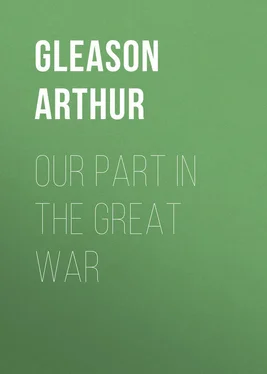Arthur Gleason - Our Part in the Great War
Здесь есть возможность читать онлайн «Arthur Gleason - Our Part in the Great War» — ознакомительный отрывок электронной книги совершенно бесплатно, а после прочтения отрывка купить полную версию. В некоторых случаях можно слушать аудио, скачать через торрент в формате fb2 и присутствует краткое содержание. Жанр: foreign_antique, foreign_prose, на английском языке. Описание произведения, (предисловие) а так же отзывы посетителей доступны на портале библиотеки ЛибКат.
- Название:Our Part in the Great War
- Автор:
- Жанр:
- Год:неизвестен
- ISBN:нет данных
- Рейтинг книги:5 / 5. Голосов: 1
-
Избранное:Добавить в избранное
- Отзывы:
-
Ваша оценка:
- 100
- 1
- 2
- 3
- 4
- 5
Our Part in the Great War: краткое содержание, описание и аннотация
Предлагаем к чтению аннотацию, описание, краткое содержание или предисловие (зависит от того, что написал сам автор книги «Our Part in the Great War»). Если вы не нашли необходимую информацию о книге — напишите в комментариях, мы постараемся отыскать её.
Our Part in the Great War — читать онлайн ознакомительный отрывок
Ниже представлен текст книги, разбитый по страницам. Система сохранения места последней прочитанной страницы, позволяет с удобством читать онлайн бесплатно книгу «Our Part in the Great War», без необходимости каждый раз заново искать на чём Вы остановились. Поставьте закладку, и сможете в любой момент перейти на страницу, на которой закончили чтение.
Интервал:
Закладка:
Arthur Gleason
Our Part in the Great War
Three years of world war draw to a close, as France prepares to celebrate the birthday of her liberty. Never in the thousand years of her tumultuous history has she been so calm, so sure of the path she treads, red with the blood of her young men. She has never drunk any cup of joy so deeply as this cup of her agony. In the early months of the war, there were doubts and dismays, and the cheap talk of compromise. There were black days and black moods, and a swaying indecision. But under the immense pressure of crisis, France has lifted to a clear determination. This war will be fought to a finish. No feeble dreams of peace, entertained by loose thinkers and fluent phrase makers, no easy conciliations, will be tolerated. France has made her sacrifice. It remains now that it shall avail. She will fulfill her destiny. Time has ceased to matter, Death is only an incident in the ongoing of the nation. No tortures by mutilation, no horrors of shell fire, no massing of machine guns, can swerve the united will. The "Sacred Union" of Socialist and royalist, peasant and politician, is firm to endure. The egoisms and bickerings of easy untested years have been drowned in a tide that sets towards the Rhine. The premier race of the world goes forth to war. That war is only in its beginning. The toll of the dead and the wounded may be doubled before the gray lines are broken. But they will be broken. A menace is to be removed for all time. The German Empire is not to rule in Paris. Atrocities are not to be justified by success. Spying will be no longer the basis of international relationship. France faces in one direction. She waits in arms at Revigny and along the water courses of the North for the machine to crack. That consummation of the long watch may be nearer than we guess. It may be many months removed. It does not matter. France waits in unshattered line, reserve on reserve, ready to the call.
Only once or twice in history has the world witnessed such a spectacle of greatness at tension. It is not that factories are busy on shells. It is that everything spiritual in a race touched with genius has been mobilized. Fineness of feeling, the graces of the intellect, clarity of thought, all the playful tender elements of worthy living are burning with a steady light.
The author was enabled to visit Verdun and the peasant district, and to obtain access to the German diaries through J. J. Jusserand, Ambassador of France; Frank H. Simonds, editor of the New York Tribune , and Theodore Roosevelt, by whose courtesy the success of the three months' visit was assured. On arrival in France the courtesy was continued by Emile Hovelaque, Madame Saint-René Taillandier, Judge Walter Berry, Mrs. Charles Prince, Leon Mirman, Prefet de Meurthe-et-Moselle, the Foreign Office and the Ministry of War.
SECTION I
AMERICANS WHO HELPED
I
THE TWO AMERICAS
There are two Americas to-day: the historic America, which still lives in many thousands of persons, and the new various America, which has not completely found itself: a people of mixed blood, divergent ideals, intent on the work at hand, furious in its pleasures, with the vitality of a new race in it, sprinting at top speed in a direction it does not yet know, to a goal it cannot see. It is in the sweep of an immense experiment, accepting all races, centering on no single strain.
This new joy-riding generation has struck out a fresh philosophy of life, which holds that many of the old responsibilities can be passed by, that the great divide has been crossed, on the hither side of which lay poverty, war, sin, pain, fear: the ancient enemies of the race. On the further side, which it is believed has at last been reached, lie, warm in the sun, prosperity and peace, a righteousness of well-being. It is a philosophy that fits snugly into a new country of tonic climate and economic opportunity, distant by three thousand miles from historic quarrels and the pressure of crowded neighborhood. We believe that, by coming on the scene with a lot of vitality and good cheer, we can clean up the old bothersome problems and make a fresh start in the sunshine. Christian Science in a mild genial form is the national religion of America. We believe that maladies and failures can be willed out of existence. As for "the fatalities of history," "an endless war between two mutually exclusive ideals," we classify that way of thinking with the surplus luggage of autocracies.
Now, there is a wide area in life where this breezy burst of power and good-will operates effectively. It is salutary for stale vendettas, racial prejudices, diseases of the nerves, egoistic melancholias. But there are certain structural disturbances at which it takes a look and crosses to the other side, preferring to maintain its tip-top spirits and its complacency. It does not cure a broken arm, and it leaves Belgium to be hacked through. The New America trusts its melting-pot automatically to remake mixed breeds over night into citizens of the Republic. It believes that Ellis Island and the naturalization offices somehow do something with a laying on of hands which results in a nation. Meantime, we go on blindly and busily with our markets and base-ball and million-dollar films.
Troubling this enormous optimism of ours came suddenly the greatest war of the ages. We were puzzled by it for a little, and then took up again our work and pleasures, deciding that with the causes and objects of this war we were not concerned. That was the clear decision of the new America of many races, many minds. The gifted, graceful voice of our President spoke for us what already we had determined in the silence.
But there are those of us that were not satisfied with the answer we made. The fluent now-famous phrases did not content us. It is for this remnant in our population that this book is written. From this remnant, many, numbering thousands, put by their work and pleasures, and came across the sea, some to nurse, and some to carry swift relief over dangerous roads; still others to fight behind trenches and over the earth, no few of them to die. Nearly forty thousand men have enlisted. Many hundred young college boys are driving Red Cross cars at the front. There is an American Flying Squadron. Many hundreds of American men and women are serving in hospitals. Many thousands of hard-working, simple Americans at home are devoting their spare time and their spare money to relief.
I give a few illustrations of the American effort. I have not tried to show the extent of it. I trust some day the work will be catalogued and the full account published, as belonging to history. For we have not wholly failed the Allies. I have merely sought in this book to cheer myself, and, I trust, some friends of "the good old cause, the great idea, the progress and freedom of the race." I believe that the historic America has spoken and has acted in this war. In a time when our country, perplexed by its own problems of mixed blood and warring ideas, bewildered by its great possessions, busy with its own vast work of shaking down a continent, has made a great refusal, it is good to have the spectacle of some thousands of young Americans, embracing poverty, taking dangers and even death gladly. There is something of the ancient crusade still stirring in these bones. The race of Wendell Phillips and Whittier has representatives above ground. There was an America once that would not have stood by when its old-time companion in freedom was tasting the bayonet and the flame. Some of that America has come down to Chapman and Neville Hall, to Seeger, Chapin, Prince, Bonnell.
Читать дальшеИнтервал:
Закладка:
Похожие книги на «Our Part in the Great War»
Представляем Вашему вниманию похожие книги на «Our Part in the Great War» списком для выбора. Мы отобрали схожую по названию и смыслу литературу в надежде предоставить читателям больше вариантов отыскать новые, интересные, ещё непрочитанные произведения.
Обсуждение, отзывы о книге «Our Part in the Great War» и просто собственные мнения читателей. Оставьте ваши комментарии, напишите, что Вы думаете о произведении, его смысле или главных героях. Укажите что конкретно понравилось, а что нет, и почему Вы так считаете.












